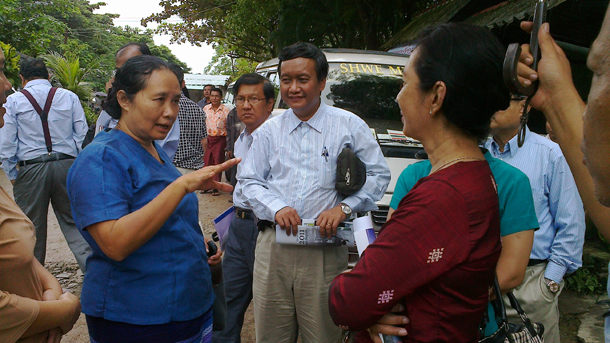Mae Tao Clinic, currently based in the Thai border-town of Mae Sot, will not yet return to Burma because of the continuing needs of migrant workers in Thailand who require healthcare services.
The announcement came to quell the fears of local people worried that the clinic would soon move inside Burma after an informal meeting was held in August with government peace negotiator Aung Min, a minister in the President’s Office.
“We want everyone to know that the Mae Tao Clinic is not going back to Burma. Our services are still very much needed along the border as the government has a long way to go to provide adequate healthcare to the people of Burma, especially those in ethnic areas,” said clinic founder Dr. Cynthia Maung.
Mao Tao released a briefing paper on Tuesday regarding its recent meetings with Naypyidaw representatives in response to persistent rumors regarding the clinic’s imminent relocation inside Burma. Dr. Cynthia is currently on a six-day trip to the United States where she is due to receive the National Endowment for Democracy award.
Staff from Mae Tao Clinic met informally with Aung Min and his delegation twice in June and August to discuss health services, stateless Burmese children born in Thailand and how skilled workers can return and work freely in their homeland.
The paper highlighted three key issues that the Burmese government prioritized during their meeting—cross-border collaboration including patient referrals between Mae Tao, Myawaddy Hospital and Mae Sot General Hospital; issuing ID cards to Burmese children; and the need for accreditation and recognition of skilled social workers.
Although Aung Min said his team would collaborate with Dr. Cynthia regarding health issues, there have been no further discussions since their second meeting, Eh Thwa, the volunteer coordinator of Mae Tao, told The Irrawaddy on Wednesday.
“We did not obtain any specific contact for further collaboration,” said Eh Thwa. “Before, they just contacted us on their arrival and never informed us in advance of the meeting.”
Although Mae Tao welcomes Nyapyidaw’s interest in their work, clinic management called for further meetings to be officially conducted in order to address “longstanding problems”—especially healthcare needs in ethnic areas that have endured decades of armed conflicts.
A statement issued by Mae Tao urged the government to follow necessary criteria to be able to have official and productive future meetings which include setting a clear agenda that is agreed upon in advance, holding meetings in a neutral location in Mae Sot, seeking permission from Mae Tao for media coverage and bringing the right participants to address local priorities.
“Unfortunately, the people from the government side who joined the recent meetings did not have the necessary knowledge, experience or positions to be able to address these key issues,” said Dr. Cynthia. “I hope that if the government wants to meet again, they will bring the right people so our conversations can have concrete outcomes towards improving health services along the border and inside Burma.”
Mae Tao provides health services to both Burmese migrant workers in Thailand and displaced civilians living along the Burmese side of the border. Half of its beneficiaries come from Burma’s ethnic areas along its mountainous eastern frontier. Despite announcing a chronic shortage of funding in June, Mae Tao’s treatments and services are currently running as normal, added Eh Thwa.

















